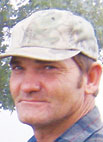
Owned and operated by Pat and Clark Cotten and son Elliott, Bending Tree Ranch is located near Damascus, Ark. The 20 acres of rough/wooded land they own offers good browse/forage for their animals. They also utilize another 40 acres for the animals’ browsing. In addition to breeding and raising both registered and commercial stock, she also breeds and sells show wethers. Dominique, a Market show wether, bred by Pat, won 1st place at the Arkansas state fair in 2007, and came in 5th in Over-All Grand Drive. They sell breeding stock nation-wide as well as sell some slaughter stock each year.
“Some people think raising goats is equal to raising cattle,” Pat said. “Goats aren’t grazers, but browsers, more like deer. People get into goats and get back out almost as fast. The demand is strong for good quality meat goats, and the healthy benefits of goat meat. "Bending Tree Ranch got its beginning while we were living in Conroe, Texas, from 1997-2000. My son Elliott was active in 4-H, and he wanted a 4-H project that was not considered “terminal" as most animal species were in that county in Texas. Market goats were new to that area and were not sold in their junior livestock auction at that time, so the students got to keep their animals after showing them. Little Gracie, our first Stiffleg/Boer, started us on our search for more of those meaty Stifflegged (Myotonic) goats."
"We raise three breeds,” she said. “Boer, which most folks are familiar with, Myotonics, which have the highest meat-to-bone ratio of all goat breeds, and a new breed developed by Onion Creek Ranch in Texas called the TexMaster Meat Goat. Plus, we have a few pure Spanish and a couple of dairy goats for milk. We started mainly raising Boer and Boer crosses, but when raised alongside the Myotonics and TexMasters, we found the latter two breeds are lower maintenance animals, hardier, consume less feed but produce a better “product." We have less kidding issues and better mothering. We have down-sized our Boer herd and will eventually phase them out all together. We are fortunate to work along with Onion Creek Ranch in breeding and selling these wonderful goats.”
A distinctly American breed, the first written record of the Myotonic goats was in Tennessee. A neuromuscular genetic condition that causes them to stiffen and sometimes fall over when startled, gave them the names wood leg, stiff-leg, nervous, or scare goats, with the most common being stiff-leg. Some people recognize the term "fainter" rather than the proper term for these goats which is "Myotonic." They don’t loose consciousness nor does this hurt them in any way. A lot of fainter-type goats are not as big, or heavily muscled as the TMG's, but that is because their breeders have selectively bred for other traits, more than larger size and more muscling.
The rising cost of feed and hay has been a challenge. Pat said, “Unfortunately, we don’t have the land to grow our own hay and feed. We feed a commercial feed and locally grown mixed-grass hay as well as utilize All-Natural cooked protein tubs for the lactating does. We are very fortunate that because of our breeding program and the quality animals we raise, marketing has not been a real problem for us. Raising goats takes a lot of hard work, leaving no time for traveling and such, yet it’s very rewarding. We sit out on early mornings or evenings, watching the goats and kids play, and just forget all our troubles.”







